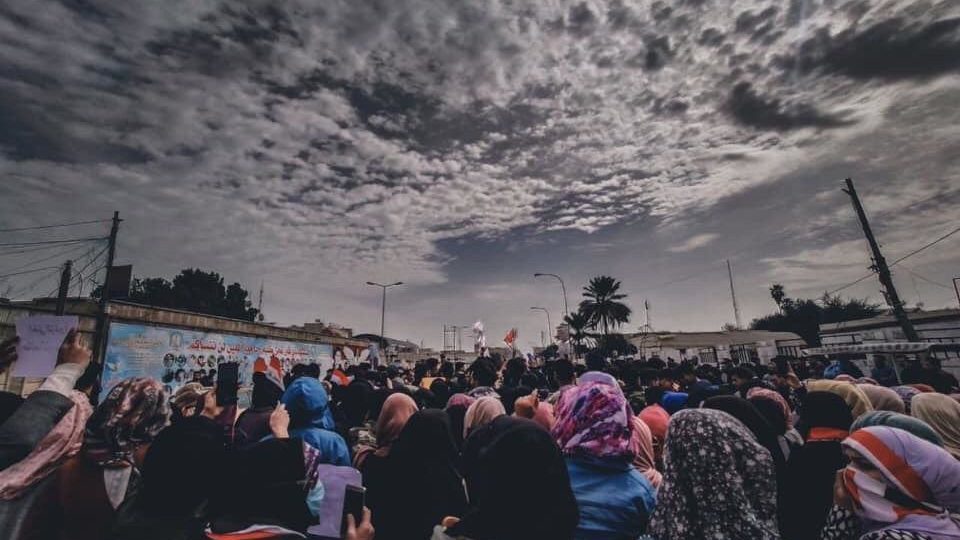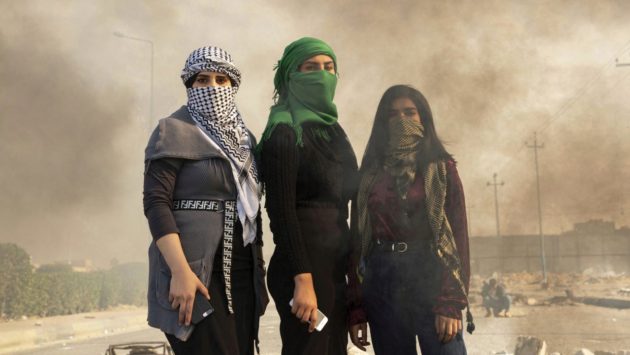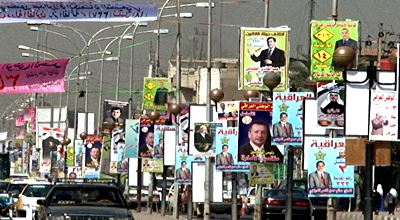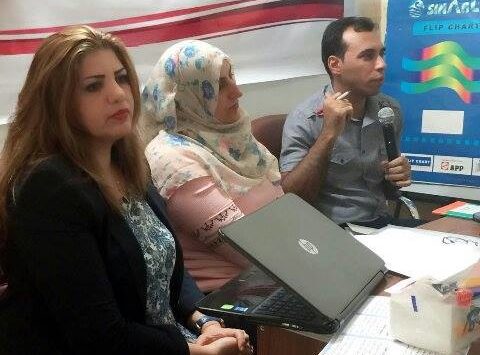Feminist Marches Take to the Streets of Iraq, Directly Challenging Social Norms
Women of the Najaf governorate in southern Iraq organized a large feminist demonstration on Wednesday, 19 February. Women came together, united under the slogan: “No authority over women” to emphasize the important role of women, not only in the ongoing protests throughout the country which started last October, but in society more generally.

The Najaf march was organized by a number of female students and the families of martyrs of the protests. It started at the University of Kufa and continued along a road for about a kilometer, finally reaching the main public square near the Najaf Provincial Council building.
Peaceful demonstrators came out to object to claims by the Iraqi cleric, Moqtada al-Sadr, who said that women should not be involved in the ongoing protests now taking place in Iraq’s public squares, nor should they interfere in politics. The women of Najaf saw these statements as a way to exclude women from political life, thus marginalizing their role in society.
No one expected a feminist demonstration of this size and strength. It included a large number of women from the city, including students, university staff and housewives. In a religiously conservative city such as Najaf, this direct challenge to the power of followers of the Sadrist movement is remarkable. This demonstration represents a significant break from the well-known gender stereotypes that have long been associated with the city.
The chants heard by feminist marchers expressed their rejection of the authority of the current corrupt political parties, and to the recently appointed Prime Minister, Muhammad Tawfiq Allawi. Together, the peaceful demonstrators voiced their insistence that the demands of the October Uprising be met, and that Iraq should undergo comprehensive political reform.

This demonstration is the first of its kind in this governorate, a place that is home to a powerful and conservative Shiite community, and where Ayatollah Sayyid Ali Sistani’s power is centered. Although Sistani has shown support for peaceful demonstrations in which people of all ages and both sexes participate, the contribution of women remains a sensitive matter. In a society where the clergy and its supporters want to impose their control over women, the march in Najaf was not immediately welcomed by the religious authority. Still, women came together despite this resistance, carrying pictures of their children and calling in their loudest voices that they will continue to sit-in and demonstrate until their demands are met.
The mother and sisters of the martyr Muhannad Al-Qaisi led the march. Muhannad was among the peaceful protesters who stood at the frontlines of the demonstrations. He was brutally shot and killed on 5 February 2020 during a heinous attack in the Sadrists’ Square in Najaf.
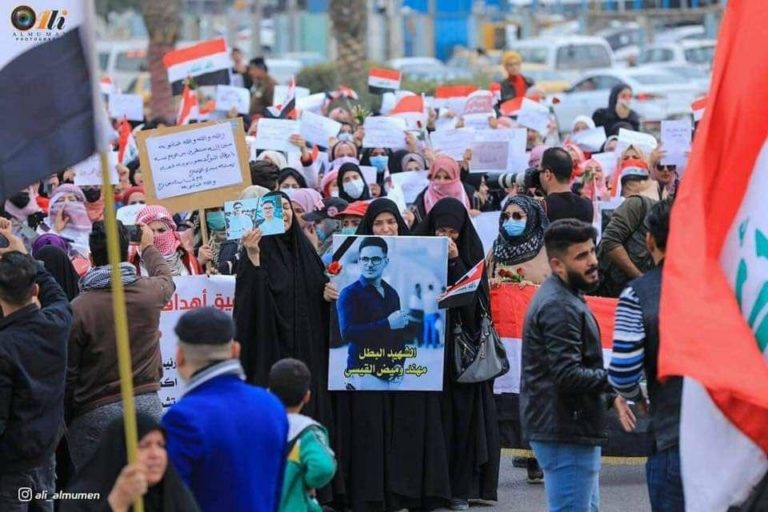
Despite the importance of this feminist march in Najaf, it was not the first of its kind in Iraq. Iraqi women and girls organized a similar march on 13 February in Baghdad in response to defamation campaigns organized by certain parties and militias. These brave women were subjected to unfounded and cruel abuse on social media that was managed by followers of these parties. Campaigns worked to malign women because of their active role in the October Uprising, and published fabricated pictures and news claiming that girls and women were behaving “in a way” in the public squares where peaceful sit-ins took place.
In the same vein, the cleric Moqtada Al-Sadr tweeted that the demonstrators should “observe the legal and social rules of the country as much as possible: they should not mix the two sexes in the tents set up in public squares, and they should rid the protests of all alcohol and drugs.” The protesters who gathered in Iraqi streets, especially women, became angry; from the very first day of this uprising, women have played a crucial role, actively participating or offering direct support to those who were injured, providing food, clothing, medical and logistical aid. The girls and woman also helped to represent the uprising in the media, as well as though photography, graffiti, and various other civic activities.
As a result of their participation, Iraqi women have faced the same repression, beatings, killing and arrests as their brothers in the demonstrations.
Therefore, when a campaign to distort the role of women emerged and expanded, attempting to deprive them of their right to take part, the response came quickly. Calls went out through the media and the women themselves organized a massive, nonviolent feminist march in the Saadoun tunnel in central Baghdad.
Hundreds of women of all ages gathered in the tunnel to go to Tahrir Square, calling out wonderful chants, some of the most prominent were: “Your voice is the revolution and there is no shame” and “Women are the revolution” and “Separating religion from the state is much better than separating men from women”. These revolutionaries, marching together for love of their country, also carry banners, again with the most beautiful and powerful slogans: ’’I was born an Iraqi to become revolutionary” and “No voice can rise above the voice of women” and “No America or Iran, Baghdad is the one”.
22-years-old Saba told France Press,
“We started to protest to topple the regime. Now we are marching for women because, as women, we refuse to be held down and insulted.”
During their march in the Saadoun tunnel and Tahrir Square the peaceful demonstrators did not forget the women martyrs of the revolution. They raised pictures of a number of them including one of Sarah Talib, who was killed when the demonstrations were just beginning — militia members stormed her house, shooting both her and her husband for participating in the nonviolent protests against government in Basra governorate.
There was also the photo of Huda Khudair who while working as a paramedic was shot down when leaving the public square in Karbala in January.
There was also the picture of Zahraa Ali Salman, who was only nineteen years old when the militia kidnapped her while she was leaving Tahrir Square. She was beaten and tortured for 10 hours before her dead body was left in front of her parents’ home.
There was also Jinan Al-Shahmani, who worked as a paramedic for the protesters in the public square in Basra. She was killed on 22 January when masked men opened fire on the peaceful demonstrators there.
The girls and women of Iraq chose to demonstrate as evidence of their active presence and strength, and to announce their continued support for the revolutionaries. They march to repel and defeat all the vicious rumors and accusations which extremist voices have used to disrupt the October uprising and women’s role in it. Theirs is a march for change, a march to break out of the stereotypical roles assigned to them by outdated political parties who have far too long controlled the fates of too many people. A woman’s place in not only in the home, but also in the public squares, where she too can call for her rights alongside men.

